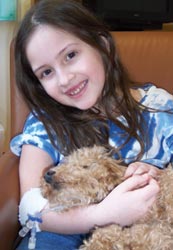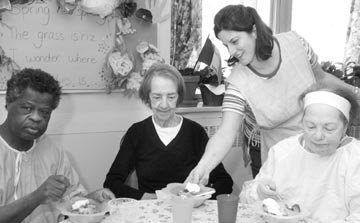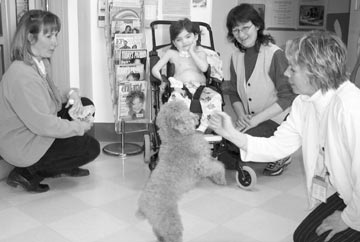Play's the thing!
 As part of the Montreal Children's Hospital's Child Life program, patients enjoy spending time with their furry-footed therapist, Porto. |
Therapeutic Recreation focuses on a wide range of techniques to improve the physical, cognitive, emotional, social and leisure needs of patients. Therapists also assist patients in developing skills, knowledge and behaviors for daily living and community involvement.
At the RVH and Montreal General Hospital sites of the MUHC, the Therapeutic Recreation programs are found in the Transitional Care Unit. The patients here are mainly elderly, and awaiting placement in a nursing home or other long-term care facility. For many, the stay in hospital can be as long as a year.
The programs provide the patients with experiences that will improve their quality of life. They offer opportunities for social interaction, provide a change of environment through activities such as special outings and holiday celebrations, stimulate the senses with programs like music therapy, reduce isolation and allow for creative and emotional expression.
Maggie Blaise, a Therapeutic Recreation Specialist at the RVH, says recreation therapy puts the "fun" into function. "We provide tools and approaches so that patients can incorporate leisure into their lifestyle, as well as adaptations to favorite activities, so that they can engage in previously enjoyable pursuits despite the limitations of illness or disability," she says.
By reducing feelings of depression and trying to ward off further physical disability, therapeutic recreation offers patients ways to help ease the adjustment they may face in a long-term care environment, while giving them back a sense of independence, autonomy and accomplishment.
At the MGH, Therapeutic Recreation Specialist Tammy Letts describes one aspect of a program that focuses on many arts and crafts activities. "On Mondays we have a music therapist who sees several patients in a one-to-one setting, usually those who are more isolated. Using musical instruments helps patients get in touch with their feelings and tap into past leisure interests. If, for example, they were musicians, it's a great opportunity for patients to reminisce and also provides them with a counseling session," she says.
Often patients with dementia have short-term memory problems, but their long-term memory remains accessible. Letts describes the "Pennies" game as a means of helping them retain this. When players answer specific questions that tap into events from the past, such as "What color were you wearing when you got married?" they get to pick up a certain amount of pennies. The "game" also requires patients to use their cognitive skills, such as adding up how many pennies they collect. "It's fun, but with a purpose."
Playtime At The Children's
At the Montreal Children's Hospital of the MUHC, play is at the centre of care. "Everything we do is through play," says Marie-France Haineault, a certified Child Life Specialist and Professional Coordinator. "We have several big patient puppets, each representing different medical conditions. A child with renal problems will interact with a puppet that has tiny kidneys. So, if the child needs a kidney removed or a transplant, we can show them how the procedure will be done and why. Through the child's interaction with the puppet we are also aware of and can correct misconceptions."
Certified Child Life Specialist Judy Edes works with kids who are receiving treatment in the Hemotology/Oncology unit at The Children's. "We're trying to bridge the gap between being inside and outside of the hospital and make the child's experience as normal as possible," she says. One of the activities she offers is a cooking group. "Often with chemotherapy their taste changes - the program also helps stimulate the appetite."
Haineault emphasizes that the most rewarding aspect of her job is making a difference for the child or adolescent and the family. "When you see a child who has gone through a long journey in the hospital going home with a smile and later see them on a follow-up visit, excitedly telling you all about what they're doing at home and school, that's the reward!"
And Tammy Letts will not soon forget a 102-year-old woman who came to the Breakfast Club, an MGH program for patients with eating or appetite issues. The patients are invited to breakfast in the dining room, decorated by staff and volunteers to create a homey environment. Although she hadn't eaten in two days, Letts says "she ate French toast with relish, and looked at me saying - I haven't had French toast like this since my Mum! I am glad that we were able to give her this moment of gratification."
- Peggy Niloff
 The Therapeutic Recreation program offers patients activities that will improve their physical, cognitive, emotional, social and leisure needs. A group of patients celebrated spring by painting Easter eggs and preparing a special lunch. |
Thanks to the support of generous donors like the Starlight Children's Foundation Canada, the Gillian Tayar Fund of the MCH Foundation, and the CN Employees' and Pensioners' Community Fund, Porto now participates in individual and group animal therapy session every Wednesday at the Hospital's Family Resource Centre.
"Paws" for Comfort!
At The Children's, tears turn to smiles as "paws-on" therapist Porto makes his rounds. For little patients, being away from familiar surroundings, Mom and Dad, and facing painful procedures or an operation, a hospital stay can be very scary. Thankfully, comfort and a cuddle are close at hand - provided by this very special four-footed furry "therapist." Porto is an apricot-coloured miniature poodle, specially trained by Zoothérapie Quebec. "When this adorable little dog is on the couch and the kids are petting him, a therapeutic milieu is created on a very tactile level. A fun and pleasant environment is instantly created," says Judy Edes, who spearheaded the pet therapy program. "Porto's visits are also beneficial for parents and at times even a de-stressor for staff, who will on occasion stop by during their shift to give Porto a quick cuddle!" - P.N. |

